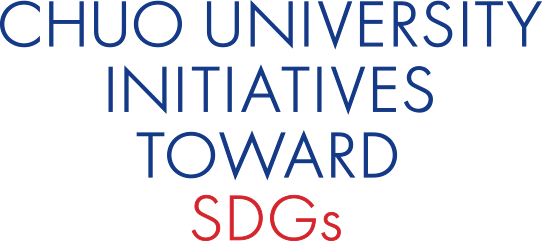2022
中央大学のSDGsへの取り組みINITIATIVES
- HOME
- 中央大学のSDGsへの取り組み
- SDGsに関連する課題に関する学生の研究プロジェクト
CHUO UNIVERSITY TOWARD SDGS
2023.03.31
SDGsに関連する課題に関する学生の研究プロジェクト
- SDGs目標
-
- カテゴリ
-
【取り組みのテーマ】SDGsに関連する課題に関する学生の研究プロジェクト(法学部教授 アンディ・バーフィールド)
取り組み実施年度
取り組み概要、意義、成果
2022年に担当した3つの英語コースでは、6~7週間のサイクルで学生がSDGsに関連する諸問題に取り組むことに一貫して焦点を当てた。それらのコースは上級英語、英語(Ⅳ)・(Ⅷ)、 英語(C)1・英語(C)2の3つである。典型的なサイクルでは、学生は3~4週間リサーチをしてノートを作成し、リサーチの進展に沿って、毎週授業中ペアになってノートについて説明し議論をした。各サイクルの終盤には、まとめとなるプレゼンテーションをペアや小グループで行ったり (上級英語・英語(Ⅳ)・(Ⅷ))、または実社会に根差したジャンルの文章(例えば、ブログ、キャンペーンのパンフレット、行動を起こすことを求める手紙、ドキュメンタリー動画の批評)を作成したりもした(英語(C)1&英語(C)2)。上級英語の学生は、学生自身の興味に従い、日本または他の社会における幅広い人権問題と労働問題からテーマを選んだが(参考URLを参照)、これらには、働き甲斐があり人間らしい仕事に相応しい労働権や、社会や雇用に関わる様々な不平等や差別といった問題が含まれる。同様に、他の2つの科目の学生も、自らの興味に従い、地球規模の問題を選びリサーチを行った(参考URLコースウェブサイトを参照)。彼らに対しては、例えば地域社会や彼らが属するネットワークへの影響を探ることを通して、問題への個人的な結びつきを見出すよう指導した。学生たちは、ファストファッション、フェアトレード、LGBTIQ、現代の奴隷制度、マイノリティー、移民、貧困などに関係する、環境、人権、労働者の権利など多様な課題を選択した。授業の意義と結果としては、以下のように述べるのが妥当だろう。(1)学生が自分自身、またはクラスメイトが調べた様々なSDGsに関連する問題について、知識と理解を発展させることができた。(2)異なる問題間の相互関係への気付きを得ることができた(例えば、差別と貧困、ジェンダーと気候変動、気候変動と強制移住など)。(3)社会正義全般に関して、より批判的な学識を得ることができた。(4)そのような問題について自身の理解したことを、自信、創造性、批判性とともにのびのびと英語で表現し議論できるようになった(英語の習熟度レベルに関わらず)。また、(5)このようなコンテントベースの授業における、対話的で探求型のアプローチが、たとえ全員ではないにせよ、ほとんどの学生の英語の使用や習熟度を(異なった度合いで)向上させる手助けとなった可能性は高い。
【Theme of the initiative】Student research projects on SDG-related issues(Faculty of Law Professor Andy Barfield)
Year of implementation
2022
Overview of initiatives, significance, and results
Three English courses that I taught in 2022 had a consistent focus on students engaging with different SDG-related issues over cycles of 6-7 weeks. The courses were上級英語, 英語(Ⅳ)・(Ⅷ), and 英語(C)1& 英語(C)2. In a typical cycle students would research and make notes for 3-4 weeks, explaining and discussing their notes in class each week in pairs as their research developed. In the final part of each cycle the students would either give an end-of-cycle presentation-discussion in pairs and small groups in class (上級英語 & 英語(Ⅳ)・(Ⅷ)), or produce an end-of-cycle written product (英語(C)1& 英語(C)2) in real-world genres (for instance, blog posts, campaign leaflet, letter calling for action, documentary video review). According to their interests, the 上級英語 students chose from a wide range of human rights and labour issues in Japan and other societies (see the course website below). These included key labour rights that pertain to decent work, as well as multiple issues of inequality and discrimination in society and/or employment. Similarly, according to their interests, students in the other two classes chose global issues (see the course websites listed below). They were guided -- for the issues that they researched -- to make personalised connections, by, for example, exploring impacts on local communities or networks they are part of. Students chose many different issues, such as environmental and human/labour rights issues connected to fast fashion, fair trade, LGBTIQ, modern slavery, minorities, migration, or poverty. In terms of significance and results, it is reasonable to claim that students could (1) develop their knowledge and understanding of different SDG-related issues that they researched themselves or other students researched within their class; (2) start to become aware of the interconnections across different issues (for example, discrimination and poverty, gender and climate change, climate change and forced migration); (3) become more critically informed about social justice issues in general; and (4) become more confident, comfortable, creative, and critical in expressing and discussing their understandings of such issues in English (whatever their level of English proficiency). It is also highly likely that (5) the interactive, inquiry-driven approach of these content-based classes enabled most, if not all, students to develop their use of, and proficiency with, English (to differing degrees).
